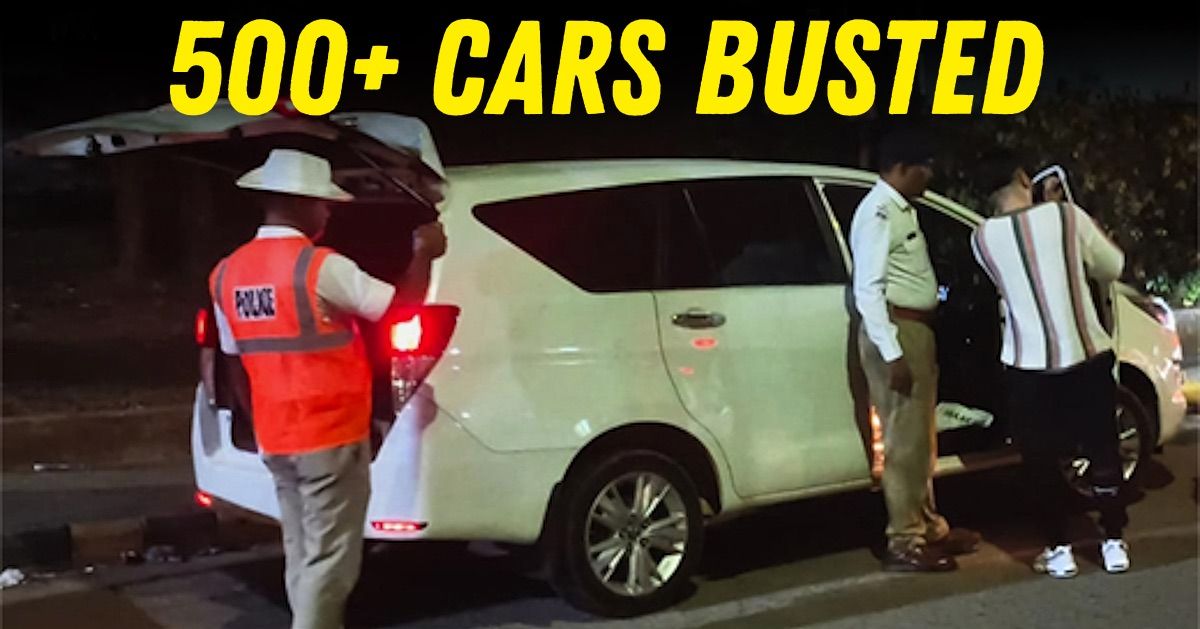Anti-Sunfilm Drive Is Back: 504 Cars Fined, Rs. 2.53 Lakh Collected


Cracking down on vehicles with sun films was once common in many parts of the country. After a brief hiatus, it looks like the anti-sunfilm drive is back in action. The Mangaluru City Traffic Police has made enforcement drive against illegal car modifications stricter.
The latest reports say that Mangalore traffic police booked 54 vehicles for using tinted windows and collected Rs 2.53 lakh in fines. The Supreme Court effectively banned the use of sunfilm in India, in its 2012 ruling.
Between May 2 and May 11, Mangaluru’s traffic enforcement wing conducted a focused campaign to identify vehicles using dark films or tints on windscreens and side windows. Special check-posts were set up across the city to inspect vehicles and verify documents.
According to the City Police Commissioner, Anupam Agrawal, those found violating the law were made to remove the tints on the spot. Officers also briefed drivers and vehicle owners about the Supreme Court guidelines, warning that the drive would continue in the coming weeks as well.
Our team recently had a first-hand experience of Mangalore Traffic Police's active enforcement. We were about to enter Mangalore from Kerala, when a cop asked us to stop. There were, in fact, two of them. Once we stopped, they came close to the vehicle that we were in- a Kia Seltos with absolutely no aftermarket fitments.
One of them asked us 'Do you have sun film on?'- in a tone that wasn't arrogant or abusive. We politely said 'No'. To double check, he then asked us to lower the co-driver's window glass. We did. The cop then put his hand inside the cabin and checked the texture of the inner side of the window glass- where we install the film. When he was sure that there was no sun film installed, the cop politely asked us to leave!
The Supreme Court’s ruling in the 2012 case of 'Avishek Goenka Vs Union of India' strictly bans the use of any black film or tinted material, regardless of the percentage of visible light transmission (VLT), on any part of a vehicle’s safety glass. This includes front and rear windscreens and side windows. The ruling was primarily due to concerns about safety and the possibility of facilitating criminal activities. It came into effect on May 4, 2012
Commissioner Agrawal emphasized that the public should cooperate with law enforcement by removing all tints voluntarily. If any vehicle is caught with tinted windows during future checks, action will be taken under relevant sections of the Motor Vehicles Act. He also underlined that such measures are crucial for ensuring public safety and crime prevention.
The Central Motor Vehicles Rules, 1989 (CMVRs) sets clear specifications for permissible sun films or tints. It says that the Visible Light Transmission (VLT) levels of the vehicle windows should be at least 70% for the windshield and 50% for the side windows. The Supreme Court (SC) ruling, however, overrides this, and bans the use of any type of cooling film.
There have been subsequent developments and interpretations, following the SC ruling. There have also been demands for exemptions and specific regulations.
The Kerala High Court (HC) in a 2024 ruling, permitted the use of sun films, which comply with the approved regulations. This ruling was in response to petitions filed by a sun film manufacturer.
Backing its ruling, the HC referred to the 100th amendment of the Central Motor Vehicles (CMV) Rules. It allows the use of safety glazing instead of safety glass for the front, rear, and side windows. This essentially means safety glass with plastic films applied on the inside.
During the legal battle, the opposing party had cited the SC ban on sun films, which the High Court said was made before the CMV rules were amended. It even dismissed the argument that only manufacturers should be authorised to install 'safety glazing'.